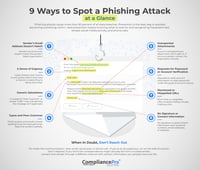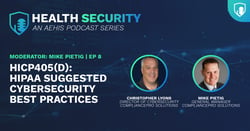Have you ever wondered who is targeting healthcare organizations with cyberattacks?
The healthcare industry is one of the most attractive targets for cybercriminals. This is because healthcare organizations store sensitive patient data, such as medical records, financial information, and social security numbers. This data is valuable to cybercriminals, who can use it to commit identity theft, fraud, and other crimes.
In addition, healthcare organizations rely on critical systems, such as electronic health records (EHRs) and medical devices, to deliver patient care. Cyberattacks can disrupt these systems and prevent patients from receiving the care they need.
“According to the U.S. government’s OCR (Office for Civil Rights), healthcare firms reported 145 data breaches in the first three months of 2023.”
That's why it's so important for healthcare organizations to understand their cyber enemies. By knowing who they are, what they want, and how they operate, healthcare organizations can better protect themselves from attack.
In this blog post, we will discuss the different types of cyber enemies that healthcare organizations face, their motivations, and how they operate. We will also provide tips for healthcare organizations on how to protect themselves from cyberattacks.
Who are the cyber enemies of the healthcare industry?
The cyber enemies of the healthcare industry include a wide range of actors, including:
- Organized crime groups
- Nation-state actors
- Hacktivists
- Insiders
Organized crime groups
These groups are motivated by profit and often target healthcare organizations to steal patient data or disrupt critical systems.
Nation-state actors
Nation-state actors, such as foreign governments, may target healthcare organizations to steal sensitive data, such as research data or intellectual property. They may also target healthcare organizations to disrupt critical infrastructure or sow discord.
Hacktivists
Hacktivists are individuals or groups who are motivated by ideology or social causes. They may target healthcare organizations to protest government policies or corporate practices.
Insiders
Insiders are employees or contractors who have access to sensitive data or critical systems. They may be motivated by financial gain, revenge, or other personal reasons to attack their employers.
“The key to an effective defense strategy is defining who the threat actor is and what threats they are making. This means tracking the threat actors’ tactics, threats, and procedures to learn more about them. Organizations must [also] act on the intelligence they have, including using it to hire appropriate cybersecurity professionals.”Colonel (res.) Shmulik Yehezkel, Chief Critical Operations Officer at CYE
Source: Cyber Defense Magazine 2022
What do cybercriminals want?
Cybercriminals want a variety of things from healthcare organizations, including:
- Patient data
- Financial information
- Intellectual property
- Disruption
Patient data
Patient data is valuable to cybercriminals because it can be used to commit identity theft, fraud, and other crimes. Cybercriminals may also sell patient data on the dark web to other criminals.
 Financial information
Financial information
Healthcare organizations process a lot of financial information, such as credit card numbers and bank account numbers. Cybercriminals may steal this information to commit fraud or use it to fund other criminal activities.
Intellectual property
Healthcare organizations often have valuable intellectual property, such as research data and drug formulas. Cybercriminals may steal this intellectual property and sell it to competitors or use it to develop new products or services.
Disruption
Cybercriminals may also attack healthcare organizations to disrupt critical systems or sow discord. For example, they may launch a ransomware attack to encrypt critical files and demand a ransom payment. They may also launch a denial-of-service attack to overwhelm a healthcare organization's website or servers.
How do cybercriminals operate?
Cybercriminals use a variety of methods to attack healthcare organizations, including:
- Phishing emails
- Malware
- Zero-day attacks
Phishing emails
Phishing emails are fraudulent emails that are designed to trick people into revealing sensitive information or clicking on malicious links. Cybercriminals often send phishing emails to healthcare employees, posing as legitimate organizations such as banks or government agencies.
 9 Ways to Spot a Phishing Attack at a Glance
9 Ways to Spot a Phishing Attack at a Glance
Check out our handy infographic on spotting phishing attacks - perfect for sharing with other employees.
Want more infographics? Look at the 8 Most Common Types of Phishing Attacks next.
Malware
Malware is malicious software that can be used to damage or disable computer systems. Cybercriminals often distribute malware through phishing emails or malicious websites.
Zero-day attacks
Zero-day attacks exploit vulnerabilities in software that are unknown to the software vendor. These attacks are often very difficult to defend against because there are no patches available to fix the vulnerabilities.
How can healthcare organizations protect themselves from cyberattacks?
Healthcare organizations can protect themselves from cyberattacks by implementing a comprehensive cybersecurity program. This program should include the following elements:
-
Security awareness training: Employees should be trained on how to identify and avoid cyber threats, such as phishing emails and malicious websites.
-
Strong passwords and multi-factor authentication: Employees should use strong passwords and multi-factor authentication to protect their accounts.
-
Up-to-date software: Software should be kept up to date with the latest security patches.
-
Network security: Firewalls and other network security devices should be used to protect networks from unauthorized access.
-
Data encryption: Sensitive data should be encrypted to protect it from unauthorized access.
-
Incident response plan: Healthcare organizations should have an incident response plan in place to deal with cyberattacks when they do occur.
-
Take help of security consultants: Seeking advice from a reputable, experience cybersecurity consulting service can help an organization get a clearer understanding of their unique needs and how best to approach stronger cyber resilience.
10 Tips That Will Improve Your Security Resilience on Any Budget
 Download the whitepaper now and get smart about cybersecurity. This whitepaper will review ten critical strategies organizations can pursue to improve their cybersecurity resilience, even on a small budget.
Download the whitepaper now and get smart about cybersecurity. This whitepaper will review ten critical strategies organizations can pursue to improve their cybersecurity resilience, even on a small budget.
Conclusion
By understanding their cyber enemies and implementing a comprehensive cybersecurity program, healthcare organizations can better protect themselves from cyberattacks.
Conduct regular risk assessments: Healthcare organizations should conduct regular risk assessments to identify and mitigate security risks.
Implement a security framework: A security framework, such as the NIST Cybersecurity Framework, can help healthcare organizations to develop and implement a comprehensive cybersecurity program.
Get help from experts: Healthcare organizations should seek help from cybersecurity experts.
 Listen to podcast about the HIPAA Cybersecurity Best Practices in 2023 and learn some of the significant practices that your organization can take to stay protected from the cyber-attacks.
Listen to podcast about the HIPAA Cybersecurity Best Practices in 2023 and learn some of the significant practices that your organization can take to stay protected from the cyber-attacks.
How We Can Help
As a leading cybersecurity firm specializing in protecting healthcare organizations, we are here to assist you in safeguarding your sensitive data and securing your systems. Our team of experienced professionals understands the unique challenges faced by the healthcare industry when it comes to cybersecurity.
We provide comprehensive security services tailored specifically for healthcare organizations, including security consulting, risk assessments, penetration testing, vulnerability scanning, security infrastructure implementation, and employee training.
With our healthcare industry expertise, we can help you identify vulnerabilities, develop robust defense strategies, and ensure your regulatory compliance.
Take the first step in protecting your organization and the patients you serve. Contact us today by scheduling a free consultation and learn more about our specialized cybersecurity services for the healthcare industry.


